This post may contain affiliate links.
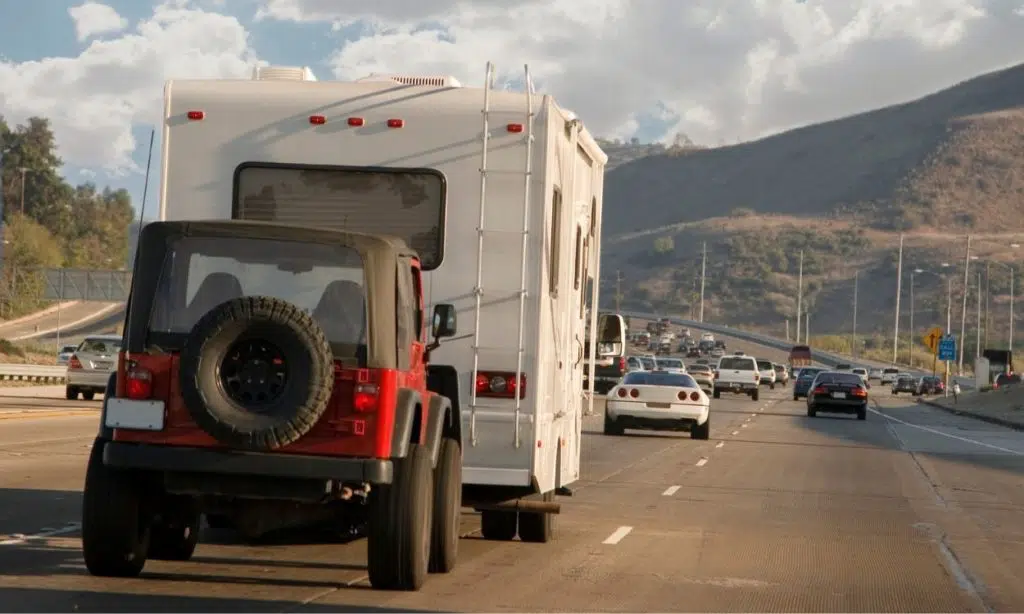
One of the biggest frustrations for RVers right now is just how difficult it can be to get an RV repaired, with delays of weeks or even months! In this post we cover the key factors, share some alternative solutions, and introduce you to a new virtual RV tech service to help you DIY many repairs, so you can keep your RV and adventures rolling, while saving time, hassle, and money.
Did you know that many RV issues can actually be resolved pretty quickly, with some simple troubleshooting and basic tools?
You may even be able to entirely avoid a visit to an RV repair shop, or having to call out a mobile technician.
So keep on reading. And if you want to learn more about the new RV tech service. And thanks to Lippert for their vision in creating an innovative solution to this challenge, and sponsoring this post, so we can get the word out and help more RVers learn how to tackle many of their own RV repair and maintenance jobs.
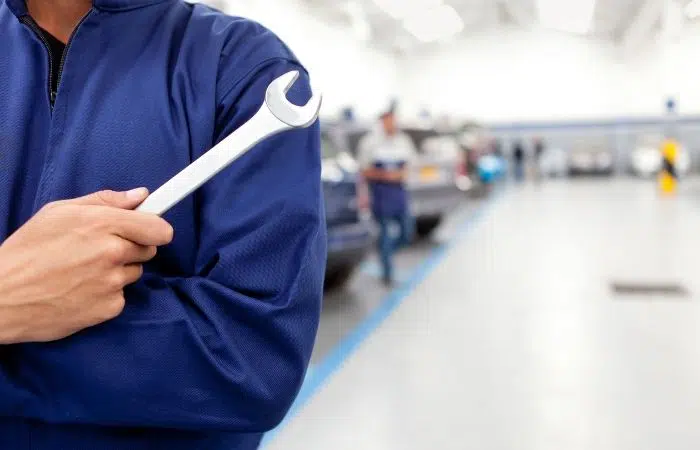
Quick Links To Sections Of This Post
- Our RV repairs and maintenance history
- Why is it so hard to get into an RV repair shop? The 6 Key Factors
- Where can RVers get the right information and learn how to DIY RV repairs?
- How to save money on RV repairs and maintenance?
- What is RV Tech Bridge? RV Technicians On-Demand
- How does RV Tech Bridge work for RV repairs?
- Get help creating a maintenance schedule for your RV
- What does RV Tech Bridge cost?
- Examples of common RV repairs and maintenance
- What RV Tech Bridge can and cannot help you with
- Join RV Tech Bridge early and be grandfathered in
- How to beat the RV repair shop crisis?
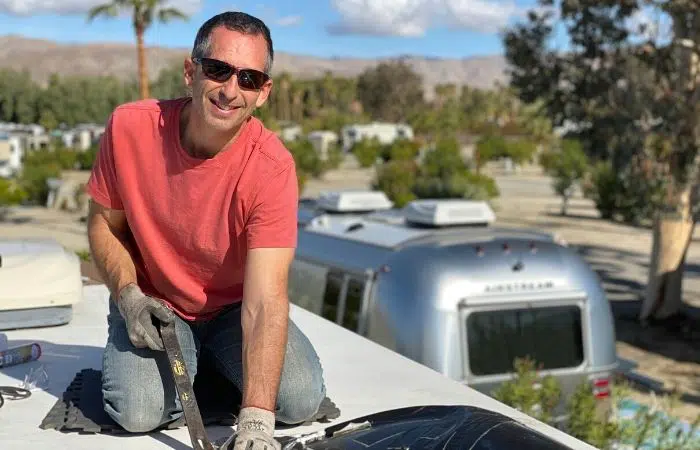
Our RV repair and maintenance history
We have been RVing since 2014, owned and traveled in three RVs, and explored all 50 states during the 6 years we full-timed. Throughout that time, we’ve dealt with our fair share of RV repairs – around 100 of them, in fact. Yes, we counted! And while a few repairs were big (thousands of dollars) and some were small (under $20), many fell somewhere in between. No matter what it is, RV repair costs all add up!
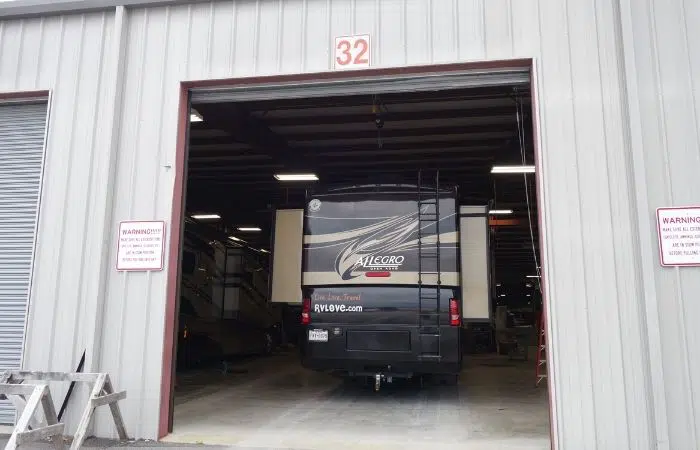
When we first began our travels, as RV newbies, we took our rig to RV repair shops for most repairs, partly because we had an RV extended warranty. After a few years, we changed RVs and moved toward doing the majority of our RV repair and maintenance work ourselves.
As our RVing experience increased, so did our confidence in doing the work ourselves. This saved us a LOT of money – literally thousands of dollars – on RV repair labor costs!
Learning how to DIY our own RV repairs
It took a while for us to feel confident doing many of our own RV repairs, and we spent a LOT of time, effort and research digging around all kinds of places trying to find the right answers. Even then, it was a bit of a risk/gamble as we weren’t always sure what we were doing would actually work.
Curious what kinds of RV repairs and maintenance we’ve done on our RVs and the cost? You’ll find them in this comprehensive post on “The Real Cost of RV Ownership” over six years, owning our first two motorhomes. And our follow up article where we take a look at the cost of full time RVing vs part time since 2014, of every RV we have owned.
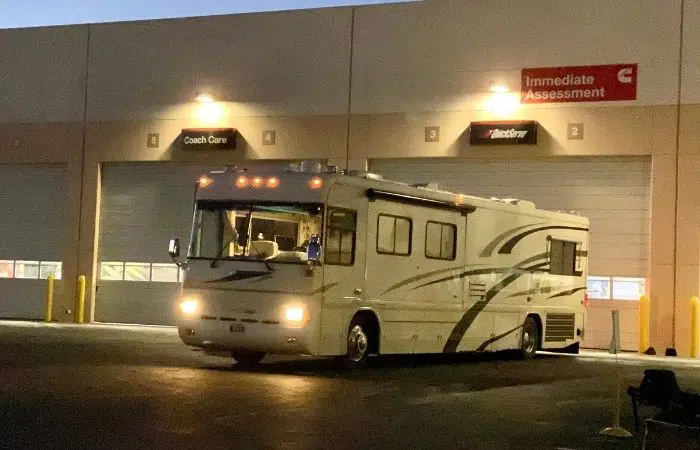
Over the years, we have found that getting an appointment with an RV repair shop – or even finding an available mobile tech – has become increasingly difficult. And as full-timers on the move and also working full-time, it wasn’t always convenient to take the RV into a repair facility! Especially if we had to be without our home on wheels for more than a day. Even today, while writing this article, we called around a few shops and found the earliest dates they were taking appointments for RV repairs were 6-10 weeks out!
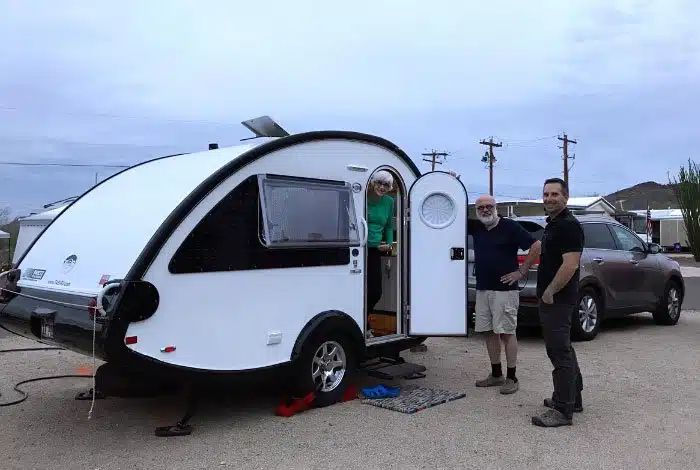
Why is it so hard to get into an RV repair shop?
It’s not just one thing causing the crunch. Here are 6 key factors contributing to this issue, which is impacting hundreds of thousands of RVers:
1. More people are RVing and many are newbies. There are millions more RVers on the roads now than a couple of years ago. Many are first time RV owners who jumped in quickly (often referred to as Covid campers) who may not be well researched, or aware of what’s involved with RV ownership and the level of care required. This all adds up to more RVers experiencing issues and needing help.
2. Lots of new RVs requiring punch list fixes. This is typical for any ‘new build’, but many customers – and even dealers – may skimp on (or skip) a pre-delivery inspection (PDI) in an attempt to save time. Sadly, this usually catches up with them. Plus the pace at which RV manufacturers are having to produce RVs to keep up with demand, impacts the quality of many units rolling off the lot.
3. RVs are like rolling earthquakes. With constant movement, overloading with gear, rugged roads, and inexpensive/less durable parts, it’s easy to see why RVs need ongoing attention. With more RVs out on the roads, more require repairs.
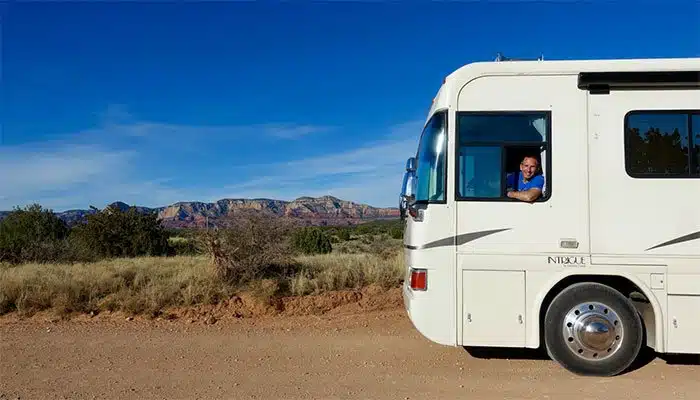
But that’s not all… we’re also facing:
4. Shortage of RV techs. This long standing issue isn’t going away any time soon. There is only 1 RV tech for every 4,000 RVs on the road. Many RV owners are waiting weeks or months for their RV to be repaired.
5. Issues with supply chain and parts availability. Waiting on parts – whether it’s an air conditioner, fridge, or small component – slows down the RV repair process, which means longer wait times for RV owners. This problem isn’t just impacting the RV industry, it’s affecting all kinds of businesses.
6. Many inexperienced RVers don’t maintain their RVs properly. User error or neglect (even if unintended) can lead to unnecessary repairs. When RV appliances and other components are properly maintained, they’re less likely to fail and need repair. For example: When RV roof seals are checked and regularly maintained, the RV is less likely to leak and cause water damage. If an RV is not winterized correctly before temps drop, frozen pipes can damage the RV plumbing system.
This has ALL been exacerbated over the last couple of years, with the pandemic surge in RVing popularity.
As mentioned above in the first bullet, a lot of people made hasty RV purchases, and as a result, many recent buyers are less researched and informed about RV maintenance needs. And while there is a lot of good information out there, it might not be getting to those who need it. Likewise, there is also a lot of bad, inaccurate, or incomplete information out there, that can do more harm than good. It can be hard to know what to trust.
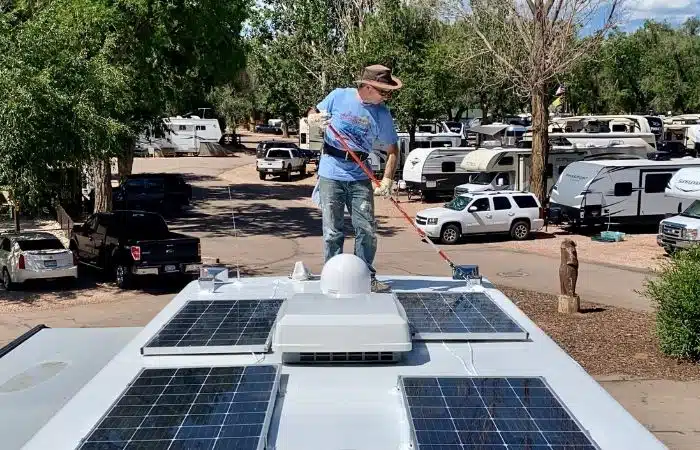
Where can RVers get the right info and learn to DIY?
Above all, look for information and support from trusted, qualified sources!
We often see RVers willing to spend tens of thousands – even hundreds of thousands of dollars when it comes to buying an RV – yet some are reluctant to spend a nominal amount on quality, professional RV advice and service. Sometimes ‘free’ can save you money, and sometimes it can backfire and end up being expensive.
Some online forums and RV owner groups can be good sources of information for specific repairs on an RV. For example: When we owned our 1999 Country Coach, we found the Owner’s Group on Facebook to be an excellent resource of experience and knowledge. But, not all online forums and groups are created equal.
As we all know, some people can be rude or unhelpful on social media. And a bigger risk is that some of the information you may find when doing a quick search on YouTube, Google or social media may not only be inaccurate, but potentially dangerous – it all depends on the issue you’re dealing with.
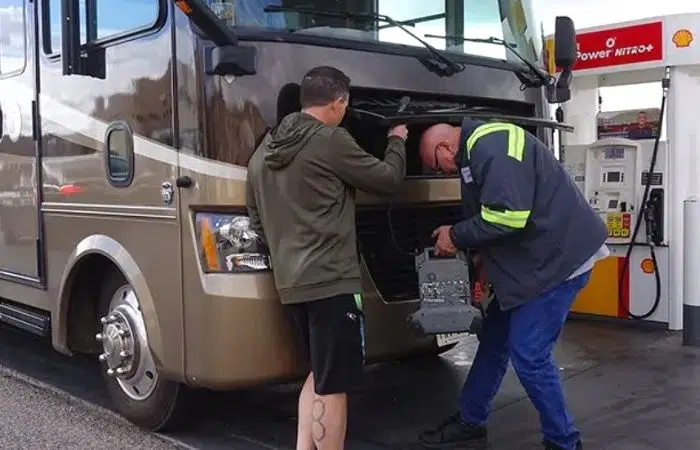
Some of the most common resources RVers use include:
- Online forums, such as IRV2. Ask a question on the interwebs, and you’re bound to see an answer pop up from IRV2. It’s a great, long established community, but keep in mind, you’re hoping to find a prior response, or that a stranger will reply in quickly. And this may not help you work an issue that is time-sensitive.
- RV Enthusiast Magazine. They have some terrific content, all written by qualified RV experts. You can access their articles and technical information online, via a paid subscription. They’ve been around a year, so their knowledge base is still growing. You can trust their information, but you won’t find everything you need.
- RV Manufacturer and Dealer Websites. Some of these have useful information for owners that are worth checking out for your specific RV. But some are also marketing focused, with limited after-sales support for RV repairs, maintenance or troubleshooting.
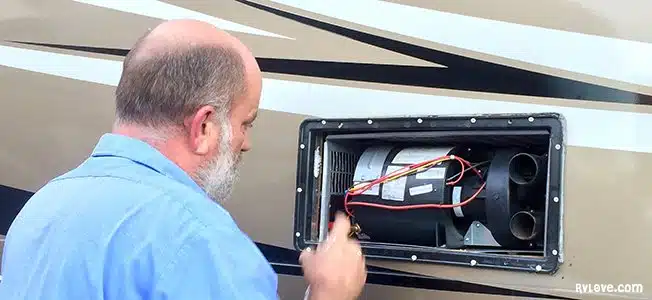
- Facebook Groups Beware! Ever had to have to trawl through a ton of irrelevant information and/or strong opinions (on just about everything) to get to something specific to your particular issue? Honestly, it’s concerning for us to see the kinds of questions people ask random folks in Facebook Groups, blindly trusting answers from complete strangers – without any idea of their experience or qualifications! Asking what toilet paper to use is one thing, but asking for specific repair advice on RV equipment is another. One mistake or bad piece of advice could cause costly damage to your rig. That said, specific RV owner groups tend to be more helpful and informed than general groups.
- Some YouTube videos and blogs can be helpful. Many are well intended, but there’s also a lot of inaccurate, or ignorant advice out there. Incorrect information shared by the unqualified can even be dangerous. And simply liking someone’s personality is no guarantee the content they share is actually accurate! How do you know who and what to trust? Do your due diligence (easier said than done).
- Take your RV to a dealer, repair shop, or call a mobile RV tech. While this is an obvious option, we know it’s not always easy. And with RV tech rates ranging between $100–$200 an hour or more, it isn’t cheap either. The good news is, it may not be necessary. Many RV issues can be quickly resolved with simple troubleshooting, and no need to go to an RV repair shop or call a mobile tech at all. But how?

How to Save Money on RV Repairs and Maintenance?
When it comes to keeping our RV running smoothly, we all want to save time, money, and avoid the hassle of being without our rig. We want to spend more time out having adventures. But what if we can’t get our RV into the shop?
The simple answer is… do as much as you can yourself… with on-call help from a qualified RV tech. More on that in a moment.
Fixing and maintaining your own RV, can be a scary or overwhelming thought. Especially if you’re an RV newbie, or don’t consider yourself to be a handy or mechanical person.
But many RV repairs are actually quite easy to diagnose and fix yourself, with just a few basic tools. That is, if you know what you are doing! If not, it can be hard to know where to start.
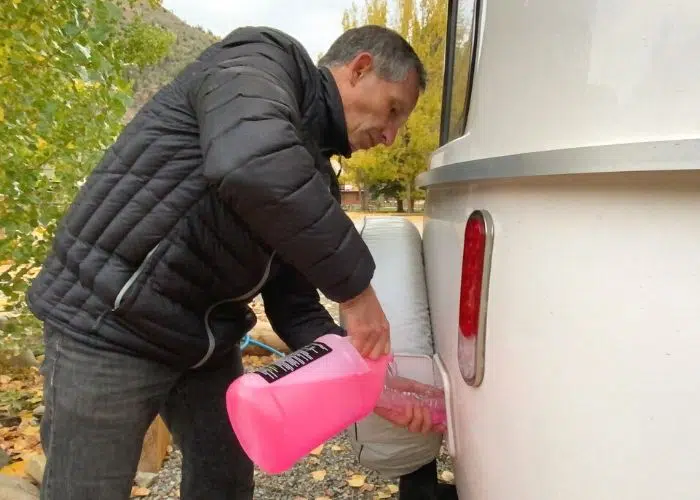
That number can increase when an RVer is being guided by a qualified RV technician.
Which raises the questions…
- How do you find an RV tech, without paying a hundred dollars an hour or more?
- What if you had access to a qualified RV repair technician to show them the issue you’re dealing with?
- And what if an RV tech could walk you through exactly what you need to know, and how to do it?
Just imagine, how much easier life would be if you could simply contact a qualified RV Technician and get the answers and guidance you need to fix your own RV repair or maintenance issue?
Now you can.
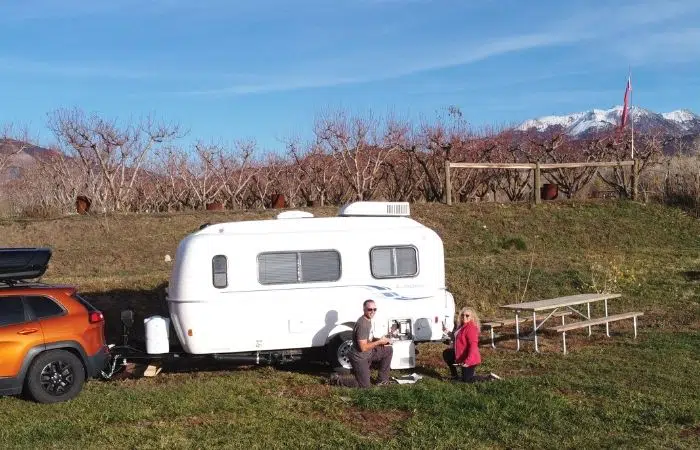
What is RV Tech Bridge?
We recently learned about RV Tech Bridge – a new, virtual solution for RVers looking for qualified RV technician support to help you with RV maintenance and repairs. It’s a customer subscription service designed to help you become more self-sufficient with your RV repairs and maintenance, and keep you on the road!
Whether it’s an RV repair, maintenance question or concern, an RV tech will walk and talk you through whatever it is you need to do on your RV. With RV Tech Bridge, you get direct access to qualified RV technicians, through:
- Unlimited live chat
- Phone calls
- Email Support
- Text Messaging and
- Visual Remote Assistance

We think of the service like an RV TelaTech where you can speak directly with a qualified RV technician. It’s kind of like calling a TelaDoc to connect virtually with a qualified doctor about your health or medical concern.
Right now, the RV Tech Bridge program is brand new and unlike anything else we’ve seen. It’s currently in the ‘alpha’ stage and we recently started using the service and technology ourselves to share our personal feedback as users. So far, we’ve found it to be interactive and very easy to use.
RV Tech Bridge (as it’s currently called – this may change) is powered by Lippert, one of the largest companies in the RV industry. We like that they are moving and shaking up a lot of things – investing in creating new tools and resources – to help resolve a lot of the challenges we RVers face. Like this one!
Based on our early experience, we’re excited to see how this program develops over time. And how many RVers this is going to help.
A great thing about RV Tech Bridge, is the peace of mind of knowing that you don’t need to tackle RV repairs and maintenance alone.
But it’s not just for inexperienced or new RVers. It’s also for those who like having a backup plan for when things go wrong. There are many ways to use the service to keep you camping in a better state of mind.
An RV Tech Bridge subscription gives you instant access to a trusted expert when you need it.

How does RV Tech Bridge work for RV Repairs?
You call, text, email or start a live chat with RV Tech Bridge where you will be connected with an RV tech expert. Then you can either explain – or better yet, show them the issue visually, through visual remote assistance – on your smartphone.
The RV tech can help diagnose the issue, and even point to / draw on a screenshot of the image and send it back, so you know exactly what to do.
To really make quick work of troubleshooting, you’ll need a couple of basic tools on hand, like:
- multimeter
- screwdriver with interchangeable tips
- small socket set or adjustable wrench
If you need parts, they’ll help you source them. And if the job needs more than one call to resolve, they’ll be there for you to help reach resolution.
Even if you’re an experienced RVer and willing to take on an RV repair or maintenance task yourself, it is extremely valuable to have access to a qualified RV tech. You can reach out – whether it’s for guidance, a second option, or to walk and talk you through – before undertaking an RV DIY job.
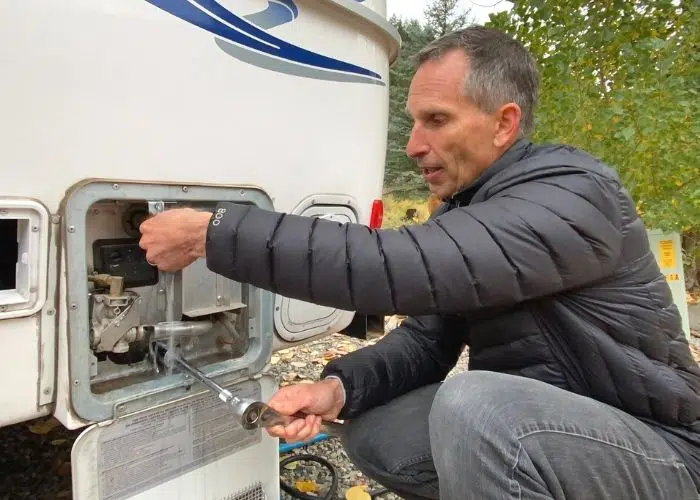
What about creating an RV maintenance schedule?
An RV Tech Bridge technician can also help you tailor an RV Maintenance Schedule specific to your rig. So you can plan ahead, know what to expect, and be ready to tackle your RV maintenance tasks when they are due.
A common complaint we hear from RVers is they have no idea how to maintain their RV – what needs to be done, when or how often! It’s not unusual for a new owner to buy an RV and drive off with little more than a quick walk through from the dealer or seller, and a big pile of manuals. Rarely will an RVer drive away with an RV maintenance checklist, specific to their RV and all it’s appliances and components, as there are so many!
RV Tech Bridge really encourages a proactive approach to RV ownership, as proper RV maintenance will help reduce the number of repairs down the road.
This is still a preview of what is to come from this program. Much more is on the way, and you can learn more about it here.
What does RV Tech Bridge cost? (currently 50% off)
RV Tech Bridge is a brand new offering that hasn’t officially launched all features yet. That’s why, for early adopters, it is currently available for a low introductory price of just $29.99 for the first 6 months. It’s normally $59.99 so right now you can get a subscriptions for 50% off.
After that, it’s $9.99 per month, so your first year will cost around $89.
That’s just $5.00 a month for the first 6 months. And an average of $7.50 a month for your first year. It’s a small price to pay for this level of technical support.
Let’s put that into perspective. RV repair shops typically charge $100 – $160 per hour. And by signing up for RV Tech Bridge service early during this initial launch period, you will have unlimited access to qualified RV technicians ALL YEAR for less than the cost of one hour in the shop.
Plus, you’ll be grandfathered in at the lowest rate ever offered, as they continue to develop the service, based on customer feedback.
The sooner you start, the sooner you’ll save
All I can say is I wish this service had been available when we started RVing back in 2014. When used to its full potential, you could literally save thousands of dollars in RV repair and maintenance costs over the years.
Note: we did pay for our access to RV Tech Bridge, so we can experience the service and provide feedback, just like every other customer.
@rvlovetravel We DIY RV repairs to save $ time & hassle.We use a remote tech service RV Tech Bridge now 50% off @ rvlove.com/RVTB #rvrepair #rvdiy #lippertpartner
♬ Jj Bluesy Rock 31-JP - Cliff Notes
@family.of.nomads If you have an RV you need RV Tech Bridge powered by @Lippert find link in bio. #lippertpartner
♬ original sound - Jess Roderick ☀️
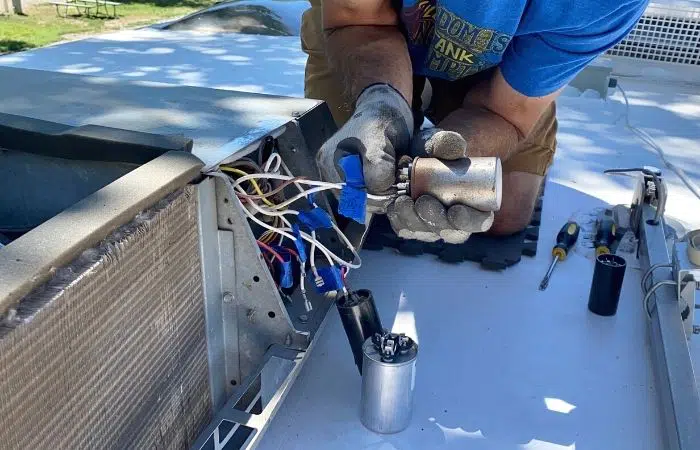
Examples of common RV repairs and maintenance
So what kind of things may need attention on an RV? Here are just a handful of examples of the repairs and maintenance that we – or RV technicians – have performed on our three RVs over the years:
- repair two air conditioners
- reseal RV roof
- troubleshoot electrical breakers and fuses
- winterize/dewinterize the camper
- lubricate slide seals
- repair locks and latches on basement doors
- replaced water pump, water heater, water faucets, fresh water valve, waste tank blade valves, toilet valves, anode rods
- replaced batteries, power window switch, furnace, jack springs, vent fans
This is not a complete list, but should give you some idea of the kinds of things that can need care, attention and repair on RVs!
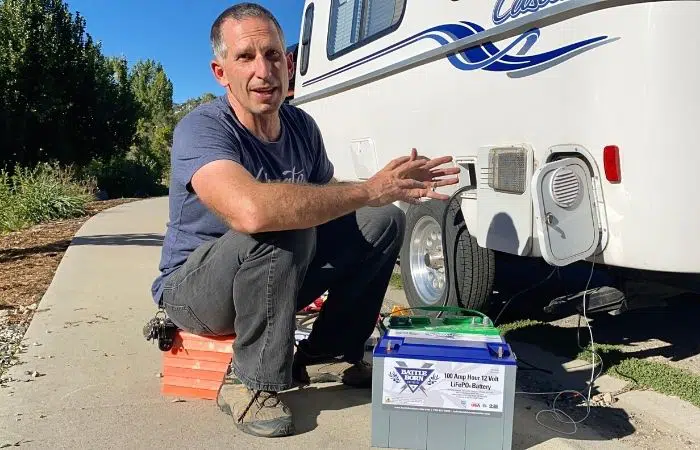
What RV Tech Bridge CAN and CANNOT help you with:
Here’s an overview of what RV Tech Bridge remote technicians CAN assist you with:
- Basic troubleshooting
- Maintenance questions
- Helping identify the right replacement and upgrade components
- Help personalize maintenance checklists
- Cleaning exterior and appliances
- Testing safety equipment
- Getting propane inspections
- RV basics
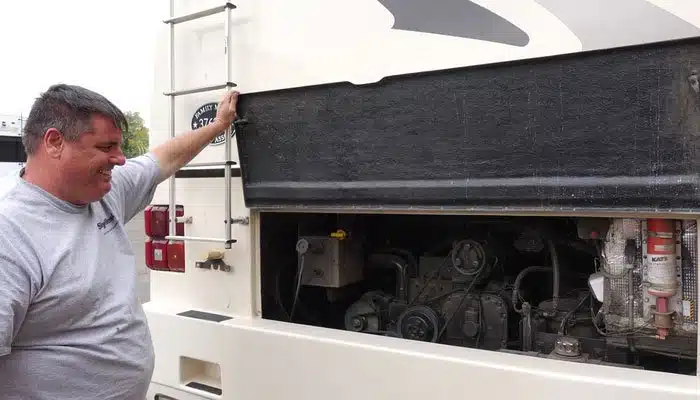
What RV Tech Bridge remote technicians will NOT be able to assist you with:
- Anything related to engine, transmission, or chassis
- Generator (small engine) repair
- Propane systems repairs
- Residential appliances
- Roadside assistance (i.e. Changing a flat tire while in transit)
- Sourcing replacement and upgrade components
- Travel planning
If used properly we believe the RV Tech Bridge program will very easily save you far more than the cost of the membership. Plus, they will be expanding their offerings in the near future.
Are you ready to start using RV Tech Bridge to be a more self-sufficient RVer?
Click to join RV Tech Bridge today
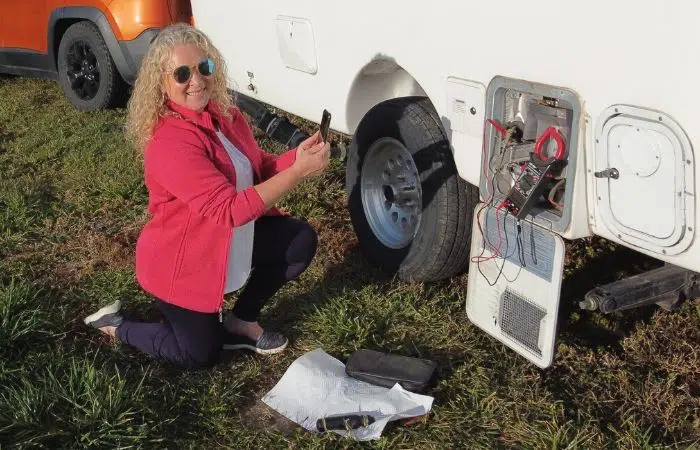
How to beat the RV repair shop crisis
Ultimately, the best way to navigate the challenges of current RV repair shop situation is to do everything you can to prevent issues from occurring in the first place! Even so, things happen, and usually just before or in the middle of a trip!
While it may not always be practical, you may want to consider scheduling an RV repair appointment with a local RV repair shop a few months in advance. Say, at the end or beginning of your RV camping season, so you have something ‘on the books’ for if or when you need it. Or, if you’re a full-timer, when you plan to be in one location for an extended period.
In the meantime, your best plan is to:
- Prioritize taking care of your own RV and minimizing repairs
- Arm yourself with the right information from qualified, trusted sources
- Create a regular maintenance schedule for your RV
- Learn how to properly maintain your RV
- Do as many RV repair and maintenance jobs as you can yourself, with qualified support (eg. from RV Tech Bridge)
Lastly, while you may not be able to do EVERYTHING yourself, you may be surprised at just how much you ARE able to DIY. And how much time and money it can end up saving you. You’ll be back out on the road sooner, so you can keep on with your RV travels.
Safe journeys! And let us know your thoughts in the comments below!
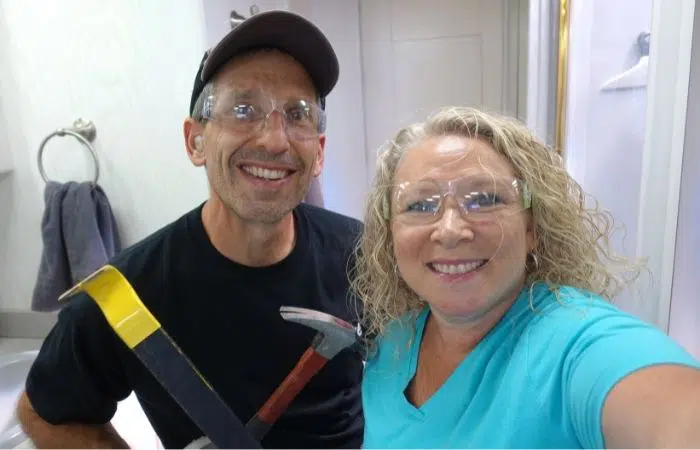
Sign up for our email newsletter with the latest RV park reviews, news and updates.
GOT COMMENTS OR QUESTIONS?
We’d love to hear from you. Do you already DIY your own RV repairs and maintenance? Would you like to do more DIY? Drop us a note in the comments section below.
More RV Repairs and Maintenance Content
Want to check out more RV Repair and Maintenance content? Hover over each image to see the post name.
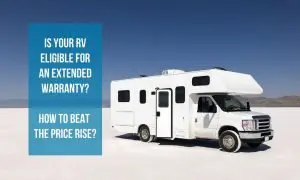
When to Buy an RV Warranty For Best Value
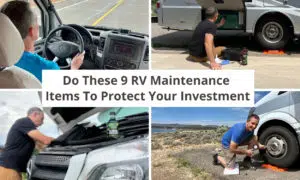
9 RV Maintenance Items To Protect Your Investment
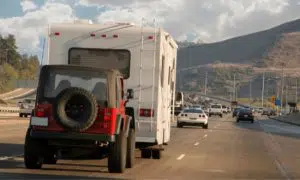
The State of RV Repairs: Problems, Solutions and On-Demand RV Techs
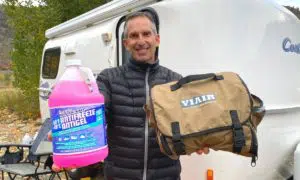
How To Winterize An RV: What You Need
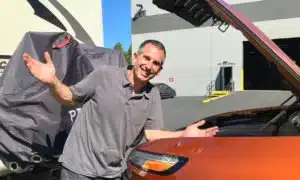
Jeep Death Wobble Fix Update – How We Fixed It
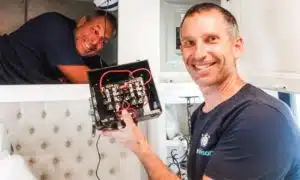
11 More RV Repairs, Mods and Upgrades To Our Motorhome
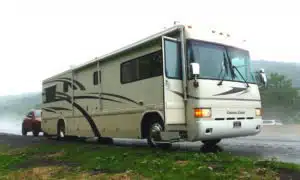
Something is Wrong! Our Death Wobble “Breakdown”
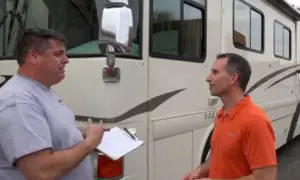
Getting a Professional RV Inspection Before Buying

Replacing Our RV Tires for Improved Safety and Performance
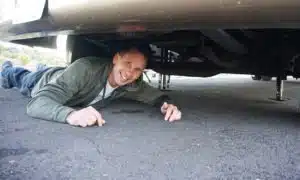
RV Breakdowns: Q&A + 10 Tips for How to Deal with Them
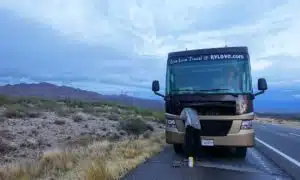
Part 2: 3 RV Breakdowns in a Month
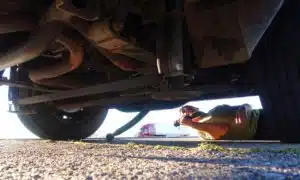
Part 1: 3 RV Breakdowns in a Month

2 Years of RV Repairs & Service Costs


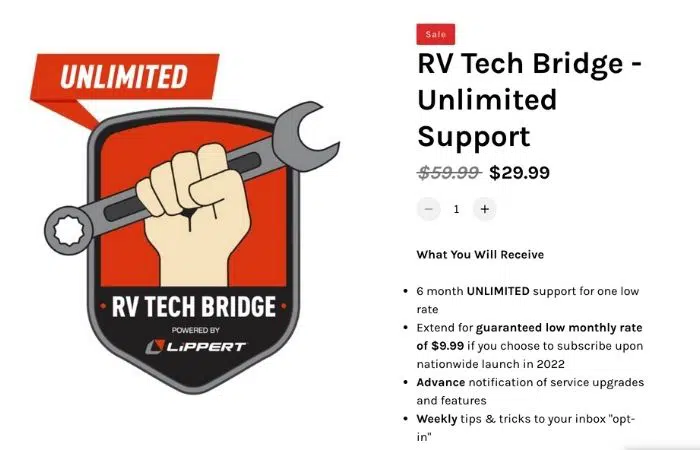
23 thoughts on “The State of RV Repairs: Problems, Solutions and On-Demand RV Techs”
Yup, I second your opinion that proper maintenance is essential to keep our RV from breaking down. Speaking of, my brother has a friend who has no idea how to fix the inside of her RV. Maybe all she has to do is find an auto repair shop immediately.
Sometimes you don’t need an RV repair shop, to fix things.
I got started RVing last year. We have a 36′ travel trailer we bought used. We got (I think) whatever manuals etc. came with it new, but that’s not a lot. For instance, there seems to be no way to get schematics of wiring and piping that’s specific to our particular TT. I took the RV Online University classes and that helped with general knowledge about RVs and RVing. I’ve used irv2 to figure out a few non-emergent issues and that’s been helpful. I’m particularly interested in setting up a maintenance schedule that’s specific to our rig. How, specifically, would RV Tech Bridge help with that?
Absolutely. Setting up a maintenance schedule is a great benefit of RV Tech Bridge, which will help you avoid some of those repairs in the future.
This is great, a very much needed service. There’s a class a owner can take to learn those 80% of issues they can fix themselves at nrvta.com.
I look forward to hearing and learning more about this service, If I feel it’s valuable I’ll send rv’ers your way.
Yes, if you have the time and money to do the training yourself, that is likely even better. But most folks we meet won’t make the time to go through the training on their own. That said, we have definitely met quite a few folks who chose to get fully certified RV technician training before hitting the road.
I have a 2014 Thor Palazzo 35.1. The front AC unit began seizing up after running for a few minutes, so I decided to replace the roof top unit. As we usually travel to southern areas such as Key West, the twin Dometic 13,000 KW units simply could not overcome the 100 deg. plus temperatures. I decided to replace the front unit with a new 15,000 Dometic. Unfortunately, the wiring does not match. I am a new member, and hope someone there can help me match this up. I figured out the 120 volt part, but the thermostat and furnace wiring aren’t so intuitive. Can someone help me with this, and what do you need to do so. I did take pictures of the wiring connections before disconnecting the old unit.
Thank you kindly,
Rich
Can always add a little complexity when making modifications/upgrades instead of replacing with similar. I would imagine that RV Tech Bridge could help with that, especially if you have the model number and instructions on the new unit and since you took pictures of the previous model wiring. Best to contact them directly though, not through our blog post. One caution is that when you make significant departures from original equipment, it could create challenges with warranties. Since you have a 2014, you wouldn’t have a factory warranty, but maybe you have an extended warranty from third party. Wishing you luck on that.
Thanks for the heads-up on this. Sounds like just what this newbie needs
Absolutely. Could be a great option for many RVers, newbies, and even those who have been out there a while, but need or want that extra support to help make sure they are doing things right.
Absolutely love the idea!!
I will be joining in really soon. Just the concept is worth the price!!
I have 2 questions:
1) If we use a speakerphone, could they (via an app) use the camera on the phone to see what we are seeing and guide us? Another person could hold the phone so the tech can see what is going on and we will be the hands of the tech.
2) Would the annual Aqua-Hot service be something they could guide me through?
We love the idea too, and absolutely agree that this early entry price is so easily worth the money. Yes, with their Visual remote assistance, they can talk to you while seeing what your camera is showing. It was really cool when we used that feature. I expect that they would be able to walk through Aqua-Hot annual servicing. We have a friend who does that DIY every year without special tools, so confident that RV Tech Bridge could assist with that. Very excited about this service, as we think it will help empower so many RVers to do their own repairs and maintenance. Being hands on with preventative maintenance will help avoid many problems down the road.
I could see the annual service for the Aqua-Hot being guided with the help of the app. The only problem I see would be how the unit was mounted, some of these units aren’t easy to access. As a mobile rv tech who is also Aqua-Hot certified I have helped may owners who I have previously done work for walk them through a repair over the phone. I can see this being a valuable service for people that have some mechanical skills and who aren’t afraid to tackle an issue with a little remote help.
Yes, that is a great example. Thanks for sharing.
In your article, you mention that RV Tech Bridge COULD help find sources for parts (If you need parts, they’ll help you source them). At the bottom under the things that they COULD NOT do, “sourcing replacement and upgrade components” is listed. What’s the difference?
Good questions! I am going to ask the RV Tech Bridge people to clarify that – stay tuned!
Hi Joey – the RV Tech Bridge team just got back to us… here is their answer:
“If they are using an approved aftermarket kit that we could get access to the instruction manual for, we could assist with questions during the installation process, the VRA makes this especially easy. However, if their component is under warranty and they want to do a modification to it that may void the warranty, then for liability purposes we typically would not assist with something that will knowingly void a warranty. They will just want to check with their components manufacturer first to verify on that end.” – RV Tech Bridge Team
Hope that helps! Thanks for asking.
Continued…
As far as parts, we can help with parts identification and point them directly to a specific parts manufacturers site like LCI or Dometic for the stock replacement part, if they want to find something local we may even be able to help them track down a local parts store or dealership that may carry the part, but we can not order parts for them or with price shopping parts on various vendors websites, etc
Good article- thanks. I do most of my own pm. I think that there are many rv’ers who have no critical thinking skills and/or mechanical aptitude. Most of my spare parts I carry I’ve donated to these people along with some of my own repair time. They appreciate it and it feels good to help someone. Over the years I’ve found good on line support through You Tube and irv2. There are also a few bloggers whom I trust and have demonstrated expertise and back round in the rv world. I’ve always said that generally if you can screw a couple of hoses together you’ll probably be ok rv’ing- and I still believe that. When we bought our first rig I didn’t know a thing about hookups but I knew it couldn’t be complicated- and it wasn’t. There’s too much emphasis put on trying to educate new rv’ers on basic stuff. This isn’t for everybody, so if you feel very uncomfortable about driving and fixing your rig maybe you should consider doing something else. On another note- I think there will always be a huge gap in owner support- in every respect, and for a lot of reasons. First, I’d suggest new owners educate themselves as much as they can and apply that knowledge in repairing their rigs. Second, RV Bridge or something similar might be a nice back up plan.
Thanks for your insights Drew. You make some good points.. new owners educating themselves as much as they can will go a long way toward having an enjoyable and less stressful experience, especially when something inevitably goes wrong! Good for you helping out others with parts and your time, that’s what RV life is all about, helping each other – RVers are good people. I think the RV Tech Bridge will bring a lot of peace of mind to those who want to know they can call someone when they need it. For $5 a month to try it out, it’s a no brainer… confidence and experience will build from there. Cheers!
Will the service cover how to add an interior fan to a refrigerator? To add temperature controlled fans to cool a refrigerator condenser?
Great question! I will ask the RVTB folks and see what they say! Stay tuned.
Hi Michael,
If you are using an approved aftermarket kit that RV tech bridge could get access to the instruction manual for, they could assist with questions during the installation process, the VRA makes this especially easy. However, if your component is under warranty and you want to do a modification to it that may void the warranty, you would want to be careful. You will just want to check with their components manufacturer first to verify on that end.